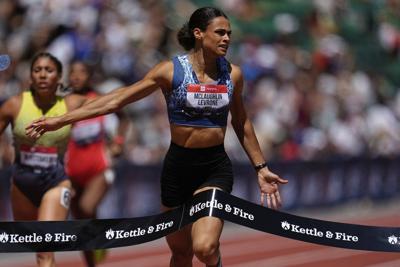TOKYO (AP) — On the hallowed list of world records in track and field, most marks are, indeed, made to be broken. Others are perched there, seemingly set in stone, beckoning all comers to dream of knocking off a Usain Bolt or Florence Griffith-Joyner and becoming one of those instantly recognizable names themselves.
Then there is this one: The women’s 400 meters. Marita Koch, East Germany, 47.60 seconds. Oct. 6, 1985.
As the 40th anniversary of that Communist-era record nears, the tantalizing prospect of it being broken rests in the talents of Sydney McLaughlin-Levrone, a once-in-a-lifetime talent with a penchant for breaking new barriers for a high-stakes run.
The four-time Olympic gold medalist and six-time world record breaker in the 400 hurdles is moving into the 400 flat for this year’s world championships.
“Over the past few years, the performances we’ve put on have created an appetite for records whenever I step on the track, which, to a degree, I guess is fair,” she said. “But at the same time, those come when they come. It takes time. A lot of learning of the event.”
A long-held record with roots in the Eastern Bloc
The history of Koch’s record is well-documented.
East Germany, as the world now knows, ran a sophisticated steroids program for its female athletes during the 1970s and ’80s. Koch’s record stays on the books because the drugs she was suspected of taking weren’t detectable at the time.
German biologist Werner Franke and his wife Birgitte Beredonk published a book detailing a state-sponsored doping scheme in East Germany that claimed Koch used a banned steroid between 1981 and 1984.
Koch, however, has maintained she has “a clear conscience.”
“I never tested positive, I never did anything which I should not have done at that time,” she said in a 2014 interview with BBC.
There are a few other longstanding records in the books that are seemingly untouchable.
Mike Powell broke Bob Beamon’s long jump record in Tokyo, the site of this year’s world championships, in 1991.
Flo Jo’s marks in the 100 and 200, which have generated across the decades, have been around since the 1980s.
But Koch’s record, along with the 800-meter mark set by Jarmila Kratochvilova of Eastern Bloc Czechoslovakia in 1983, have long resided in a different sort of category.
A threat to any record whenever she’s on the track
Enter McLaughlin-Levrone.
Before she came along, the thought of cracking 50 seconds in the 400 hurdles never entered most people’s minds. These days, McLaughlin-Levrone’s would be competitive in the 400 flat.
This week, she is among the world’s biggest threats in that 400 flat, which is one of the deepest events on the program.
The prospect of a final Thursday against Olympic champion Marlieidy Paulino and runner-up Salwa Eid Naser — whose own world championship in 2019 was tainted by a subsequent suspension for missing doping tests — brings with it the prospect of McLaughlin-Levrone being pushed to her limit simply to win, not to rewrite history.
Often, since she became the youngest athlete in a generation to qualify for the U.S. Olympic track team in 2016, she has done both.
The 400 flat is not uncharted territory for the 26-year-old, a one-time soccer player who married football player Andre Levrone Jr in 2022.
Two years ago, with world championships in Budapest approaching, McLaughlin-Levrone was preparing for that race. But injuries derailed her season and she missed those championships.
By the time she returned to train for last year’s Paris Olympics, she was back at it in hurdles. She set her latest world record there, and put that once-unthinkable 50-second barrier squarely on the radar – maybe in time for the LA Games three years hence.
Same distance but a much different feel without hurdles
First, though, the 400, which McLaughlin-Levrone said is a different animal that has forced her to forget the predictable cadence of the hurdles and “just to attack the race for what it is, and to kind of learn where I’m at without needing the checkpoints of hurdles around me.”
Lest anyone see this as a problem, McLaughlin-Levrone ran a split of 47.71 in the women’s 4x400 relay in Paris (Though the record-keeping is spotty, it’s thought to be one of the five fastest ever) to help the U.S. win in a time that missed the world record owned by the 1988 Soviet Union team by a scant .1 seconds.
Running that distance by herself will be a different task. Running for history? Well, McLaughlin-Levrone is a student of the task at hand.
Not since Koch ran her record-setting 47.60 has another woman broken the 48-second mark in the full trip around the track.
“In time, if you have the right athlete in the right circumstances and everything going right, then, yes, I do,” think the record is breakable, McLaughlin-Levrone said. “But I think we’ve got to work on getting somebody under 48 seconds first before we can even talk about 47.6.”
___
AP Summer Olympics:



















To join the conversation set a first and last name in your user profile.
Sign in or register for free to join the Conversation